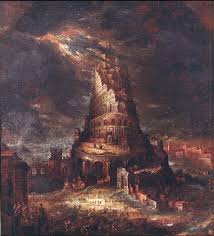"Nimrod founds an empire of naked aggression based in Babylon.
He is a tyrant,
a
mighty hunter to be feared,
and most significantly a builder of cities.
Babel, like many cities in the ancient Near East is designed as a walled
enclosure of a great temple or ziggurat, a mud-brick stair tower
designed to reach to the realm of the gods.
With such a tower, people
could ascend to the gods, and the gods could descend to earth. .....we see in it the
self-aggrandizing ambition and escalating sin of pride that drives these
people to begin building such a mighty tower. "Let us build ourselves a
city, and a tower with its top in the heavens, and let us make a name
for ourselves; otherwise we shall be scattered abroad upon the face of
the whole earth" (Gen. 11:4).
Q: What did they want?
A: Fame.
Q: What did they fear?
A: Being scattered without
the security of numbers.
The tower they envisioned building seemed huge
to them, but the Genesis narrator smiles while telling us that it was so
puny that God "came down to see the city and the tower" (Gen. 11:5).....they intend to use the creative power they possess as image-bearers of
God to act against God’s purposes.
In this case, they plan to do the
opposite of what God commanded in the cultural mandate.
--Instead of
filling the earth, they intend to concentrate themselves here in one
location.
--Instead of exploring the fullness of the name God gave them—adam, “humankind” (Gen. 5:2)—they
decide to make a name for themselves.
God sees that their arrogance and
ambition are out of bounds and says, "Let us go down and confuse their
language there, so that they will not understand one another's speech” (Gen. 11:7).
Bruce Waltke concludes his analysis of Genesis 11 in these words:
--While it might appear that God’s scattering of the peoples is a punishment, in fact it is also a means of redemption.Society apart from God is totally unstable. On the one hand, people earnestly seek existential meaning and security in their collective unity. On the other hand, they have an insatiable appetite to consume what others possess....At the heart of the city of man is love for self and hatred for God. The city reveals that the human spirit will not stop at anything short of usurping God's throne in heaven.
From the
beginning, God intended people to disperse across the world. “Be
fruitful and multiply, and fill the earth” (Gen. 1:28).
By scattering people after the fall of the tower, God put people back
on the path of filling the earth, ultimately resulting in the beautiful
array of peoples and cultures that populate it today.
--If people had
completed the tower under a singularity of malicious intent and social
tyranny, with the result that “nothing that they propose to do will
now be impossible for them" (Gen. 11:6),
we can only imagine the horrors they would have worked in their pride
and strength of sin. The scale of evil worked by humanity in the
twentieth and twenty-first centuries gives a mere glimpse of what people
might do if all things were possible without dependence on God."
TOW


